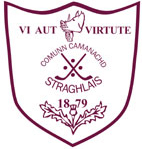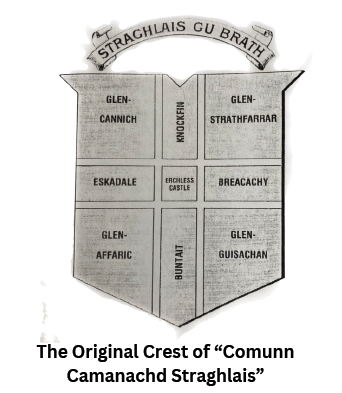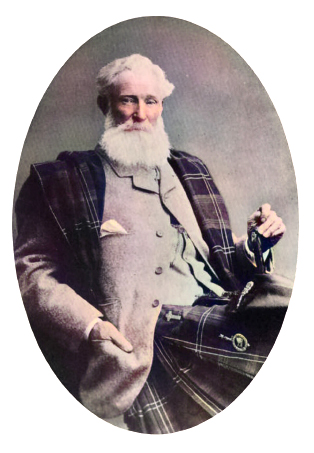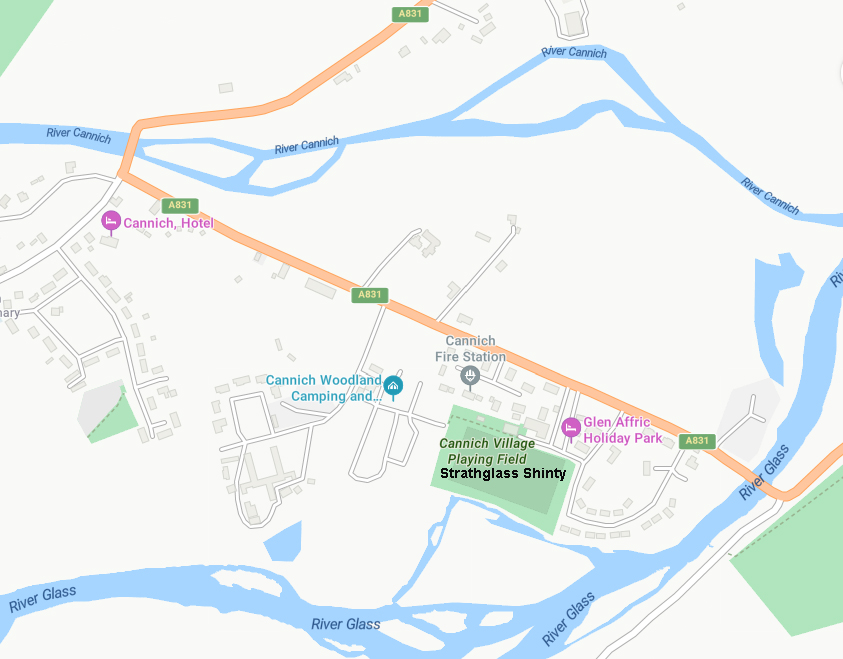Strathglass Shinty Club


Fàilte gu Fuaran na Camanachd
Welcome to the wellspring of shinty
Like all areas that were part of the Gàidhealtachd, the Gaelicspeaking lands of the Highlands of Scotland, Strathglass was no different in terms of being a hotbed of the sport of shinty. It would have been played from time immemorial as an opportunity for warriors to maintain their fitness, and more widely as a traditional pastime on festival days, in particular in the winter. The matches were traditionally scheduled for over the Christmas period. The great collector of Strathglass’ Gaelic traditions, Colin Chisholm recorded that games were held on St Stephen’s Day (26th December), St John’s Day (27th of December), New Year’s Day and Epiphany (6th January).
Chisholm’s account appeared in the radical “Highlander” newspaper in March 1880, shortly after the proper formation of Strathglass Shinty Club, or more properly Comunn Camanachd Straghlais. This was a momentous occasion in the history of the sport of the Gael and formalised shinty in the Strath in a way that would have far reaching effects.

By 1879 a number of clubs had been formed but predominantly in cities where exiled Highlanders settled. Strathglass was the first constituted club in the Highlands and “The formation of Strathglass Shinty Club marked the beginning of modern shinty in what is considered to be its northern Highland heartland.” (Reid 2000) An inaugural meeting was held at the Glen Affric Hotel on Tuesday 10th February 1880 after a procession and a vigorous game at Comar. The constitution and rules agreed at this meeting were to have a great impact upon the world of shinty, as did the man who helped steer them through: Captain Archibald MacRa Chisholm of Allt na Glaistig (Glassburn).
The former Black Watch soldier was a formidable and charismatic character. He had already been seeking challenge matches for the “Glasaich” before the club had been founded and a few years later, a challenge to neighbours Glen Urquhart was made and accepted, with the Captain to the fore. The famous 22-a-side games of shinty played between “The Strath” and “The Glen” in 1887 and 1888 at the Bught Park in Inverness had a profound effect upon the Game of the Gael. The games were fiercely fought with the 1887 game ending 2-0 to Glen Urquhart and the rematch in 1888 finishing 1-0 to the Glen. Glen Urquhart wore “A’ Churachd Ruadh”, the Red Cap, with blue shirts, white knickerbockers and blue stockings, and Strathglass wore Glengarries, white shirts and Black Watch tartan trews.

These two contests led to the formation of the Camanachd Association in 1893 and the codification of the 12 a-side game which is still played today. There was no more fitting an individual to be named the first chief of the Camanachd Association on its formation in 1893, than “Glassburn” himself. Away from shinty he was the ultimate example of a Gael. A fluent Gaelic speaker and a renowned piper. He was a judge of pipe music at the Northern Meeting Games for thirty years, but was also an accomplished fiddler. He was one of the first members of the Gaelic Society of Inverness (Comunn Gàidhlig Inbhir Nis) and was chairman of their annual dinner in 1878. He even received a song in his honour by famous Gaelic poet Mary MacKellar.
Upon his death at the age of 74 on the 19th October 1897, a devout Catholic, who had even raised a company of Chisholm men to go to Rome to defend the Pope, it was his wish to be buried in the Catholic cemetery at the Beauly. His gravestone was recently refurbished by Jon “Hearach” MacLeod with support from the shinty clubs of the Aird. Glassburn is now a private residence, but Captain Archibald MacRa Chisholm is remembered as organised shinty’s pioneering spirit in Strathglass and beyond. Since 2023, the Captain Archibald MacRa Chisholm Award has been presented by Strathglass Shinty Club to the Balliemore Cup Final man of the match.
SHA Site No: 12
Site Status: 
Location: NH 3423 3143 Landranger OS 26
Three words: january.conqueror.rejoin
Period: Modern
Date: 20th Century
Site Owner: Cannich Sports & Recreation Ground
Open: 24 Hours
Access: Via Gate from car park
Grade: Easy
Parking: At Cannich Hall
Notes: Public Toilets at Hall Easter – October
Strathglass Shinty Club play their home matches at the playing field adjacent to the village hall situated just off the A831 on the left as you enter the village from Drumnadrochit. There is a large parking area and the hall toilets are open to the public 0800 – 2000 hours daily, Easter through October. There are three interpretation panels siuated around the field detailing the history of the shinty club.

